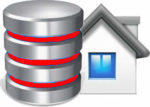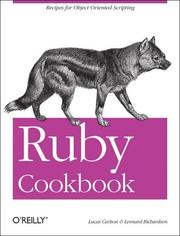Time may be money, but it’s also a piece of one’s life, and a
pretty significant piece at that. In some part, this explains the popularity of
the Ruby programming language, which is known for being a wonderful timesaving
tool. As Lucas Carlson and Leonard Richardson, authors of the new “Ruby
Cookbook” (O’Reilly) observe, “Ruby makes you more productive than other
programming languages because you spend more time making the computer do what
you want, and less wrestling with the language.”
But even Ruby programmers can spend time without accomplishing anything: writing
Ruby implementations of common algorithms, debugging Ruby implementations of
common algorithms, discovering and working around Ruby-specific pitfalls,
working on repetitive tasks that could be automated, searching for a library
that does X, and then evaluating and deciding between the many libraries that do
X. The list goes on and on. “Our lives are better spent creating new things than
fighting our own errors or trying to solve problems that have already been
solved,” Carlson and Richardson remind us. Their contribution to the cause is
the “Ruby Cookbook.”
The “Ruby Cookbook” presents hundreds of recipes that programmers can use to
save time, sharpen their skills, and master the language. If they need a web
application, they’ll find recipes that show them how to get started with Rails.
If they need to rename thousands of files, they’ll see how to use Ruby for doing
that and thousands of other everyday tasks.
“Ruby is booming, and it’s mostly because of Ruby on Rails,” says Richardson.
But he adds that a lot of people are picking up Rails without knowing much about
Ruby, or dynamic languages in general, which can be a hindrance to their growth
in the long run. “These people can function as Ruby programmers, but they lack a
bottom-up grasp of its syntax, usage, and philosophy. This book can gradually
build that knowledge in the context of solving specific common Ruby and Rails
problems.
“As these Ruby/Rails programmers become more confident, they’ll be more
interested in the domain-specific tasks covered in the Cookbook, like XML
processing and web services,” he adds. “And people who use Ruby as a
general-purpose language can use the whole book as a reference, including topics
like GUIs and distributed programming which are far removed from Rails.”
The “Ruby Cookbook” is intended for all Ruby programmers, especially those new
to Ruby and those who have trouble with Ruby’s most powerful features, like code
blocks (closures) and metaprogramming. For more experienced programmers, the
book serves as a problem-oriented reference and a way to expand the horizons of
what they can do with Ruby. Finally, for people who know several programming
languages and are interested in learning Ruby, this book can serve as an
immersion course.
“Learning from a cookbook means performing the recipes,” Carlson and Richardson
remind their readers. “Some of our recipes define big chunks of Ruby code that
you can simply plop into your program and use without understanding them. But
most of the recipes demonstrates techniques and the best way to learn a
technique is to practice it.”
To the authors, the book is an ambitious and wide-ranging project. To
programmers, it may be the most valuable book yet written about Ruby.
Yukiro (Matz) Matsumoto, the creator of Ruby, says, “Programmers don’t live by
language syntax alone, but by every line of concrete code they write. To that
end, this book is filled with practical recipes, tips, knowledge and wisdom. I
hope it leads readers to the next step of Ruby programming.”

